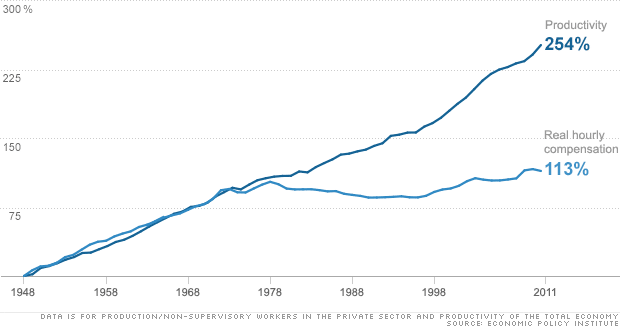Matt Iglesias showing once again that economics is hard. At least, it
seems hard for him. Because he has been saying some remarkably
ill-informed stuff lately. Here, he argues that "corporations" should pay more. And in fact, Matt (being smarter than anyone in business) recognizes that if they paid more, they'd make more money. Presumably, Matt could take this insight and start his own business, and grossly overpay workers. If he's right, he could make a FORTUNE, I'm telling you.
Problem: Far from falling, total cost of employment has been rising, sharply. Corporations have NOT been saving money by squeezing labor. The "productivity wedge" that everybody whines about (see below) is real enough. But it is due to our inability to come up with a sensible health care policy, and regulatory accounting rules that give substantial disincentives for hiring full time.

What is squeezing labor is enormous costs for medical care, pensions for older workers, and regulations that make hiring workers prohibitively expensive. You say workers are not getting pay increases? That's true. But those evil corporations are getting labor cost improvements, either.

For some reason, people ignore the second graph. It is expensive, and getting more expensive, to hire workers. The first graph simply assumes that all the "extra" profit from productivity gains is going to corporations. But it's not true. You can look it up.
Problem: Far from falling, total cost of employment has been rising, sharply. Corporations have NOT been saving money by squeezing labor. The "productivity wedge" that everybody whines about (see below) is real enough. But it is due to our inability to come up with a sensible health care policy, and regulatory accounting rules that give substantial disincentives for hiring full time.

What is squeezing labor is enormous costs for medical care, pensions for older workers, and regulations that make hiring workers prohibitively expensive. You say workers are not getting pay increases? That's true. But those evil corporations are getting labor cost improvements, either.

For some reason, people ignore the second graph. It is expensive, and getting more expensive, to hire workers. The first graph simply assumes that all the "extra" profit from productivity gains is going to corporations. But it's not true. You can look it up.
Change "evil corporations are getting" to "evil corporations are NOT getting" please.
ReplyDelete"A new Wal-Mart store in Washington D.C. has been inundated with applications for associates.
ReplyDeleteThe store is currently combing through more than 23,000 applications for 600 available positions"
It is ironic that he uses anti-Walmart pics to say wages are too low. The Walmart story that made news last week was thus...
They also measure inflation on productivity and compensation differently. Martin Feldstein has a good paper on this http://www.nber.org/feldstein/WAGESandPRODUCTIVITY.meetings2008.pdf
ReplyDeleteI don't know if Dr. Matt is complicit or just a useful idiot. The first thing I checked was what role the anti-Walmart unions played in this story. Sure enough, they admit being behind it. The real story is that one local Walmart collects goods for employees who have had financial problems. No good deed goes unpunished.
ReplyDeleteAs for the DC Walmart that Gerardo references, it almost didn't happen. Just after Walmart committed to building half a dozen stores in the under-served DC area, the city council voted to require them to pay over $12/hr minimum wage. (The wage law only applied to Walmart and not the union-shop stores, due to clever wording of the requirements.) The Council considered this a "living wage," saying anything less was cruel.
Walmart pointed out the the City Council doesn't even pay some of its workers that much. The mayor vetoed the new rules, so now 600 city residents will show up to be exploited by their cruel employer and a million residents can buy stuff cheap. The horror.
Well, Yglesias can take comfort in the fact that at least some workers are not underpaid. Slate's writers, just to take a random example, are clearly overpaid relative to the quality of their work.
ReplyDeleteHey!
This is a truly great post. It is simple but makes a very strong case that a bad error was made. It also shows how easy it is to make the error. This sort of post changes perceptions. Well done!
ReplyDelete"Of course any particular company can improve its own bottom line by cutting compensation to the bone." - Matt Yglesias
ReplyDelete"And in fact, Matt (being smarter than anyone in business) recognizes that if they paid more, they'd make more money. Presumably, Matt could take this insight and start his own business, and grossly overpay workers. If he's right, he could make a FORTUNE, I'm telling you." - Mungowitz
I don't think you are fairly representing what he said, even if what he really said is wrong and the rest of your post shows it.